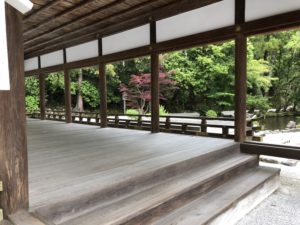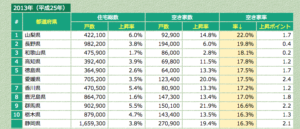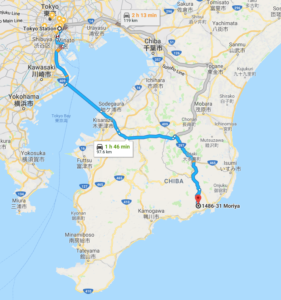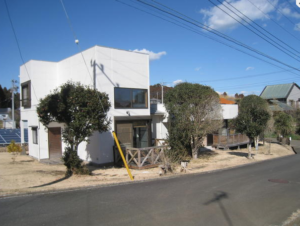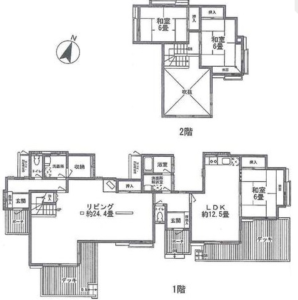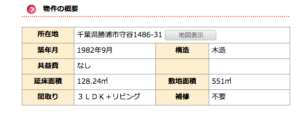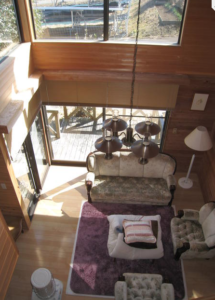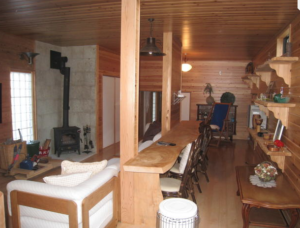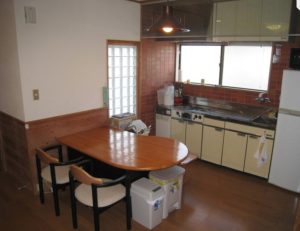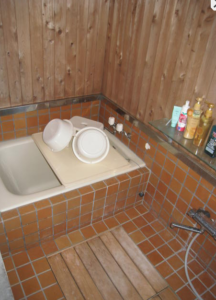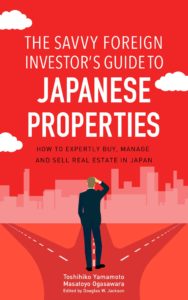Terrifying hidden crisis or treasures ?
In Japan, recycling is so much part of our culture.
And yet, it is also the norm for Japanese to demolish their houses with almost less thought than most people would give to disposing beloved ceramic bowls.
People believe homes are usually built to last 50 odd years. Japanese building culture is often described as ‘scrap and build’.
The reasons for this phenomenon range from the ageing to need for constantly updating building technology as it revolves.
With shrinking population, the result is a housing problem that is the opposite of what most countries face. Japan has too many houses that no one wants.
According to the government statistics, the number of vacant houses (空き家、akiya) in 2013 reached 8.2 million.
(But the 8.2 million includes houses/apartment units for rent that are only vacant temporarily as owners try to find tenants or buyers. So genuine empty homes that have been abandoned altogether number about 3 million)
Moreover, many who inherit a house are unable to sell them because of a shortage of interested buyers. The problem is particularly acute in rural areas.
According to one statistics, the top ten ranking of akiya in prefectures as of 2013 was as follows.
(The number indicates the percentage of akiya in dwellings of each prefecture)
In these prefectures, 1 out 5 properties are empty.
1.Yamanashi 22%
2.Nanago 19.8%
3.Wakayama 18.1%
4.Kochi 17.8%
5.Tokushima 17.5%
5. Ehime 17.5%
7. Kagawa 17.2%
8. Kagoshima 17.0%
9.Gunma 16.6%
10.Tochigi 16.3%
10. Shizuoka 16.3%
(top10 ranking)
The akiya rate(empty rate) in Tokyo Metropolitan is 11%.
Todofuken data rankingb (ranking of akiya in prefectures)
Fundamentally, the problem can only be solved by a mental and cultural shift that would allow for a rapid expansion of the Japanese second-hand housing market.
Currently only 15% of second-hand dwellings in Japan are traded in the market while developers continue to construct more than 900,000 new homes a year.
However there are also technical problems that are not helping solve the issue.
Here are the main technical challenges when dealing with akiya
1. It is sometimes difficult to identify owners
Akiya (空き家)is an abandoned house in Japanese and often no one can trace the owner of the property. The typical case occurs when the inheritance takes place.
Usually when the owner of a property passed away, the heir needs to
change the title of the property and register the new ownership with the officials.
However new owners sometimes don’t go and register the change.
If the current owner fails to register and passes away, the problem worsens further.
Perhaps there is no family member in the next generation who can correctly recognize legal ownership of the real estate. Even if a correct owner turns out, it is legally challenging to prove retroactively the right of the deceased owner and transfer the rights to the correct owner. If you cannot identify the owner of the property,
you cannot sell it.
2. Owners do not make decisions one way or another
This case also often can be seen when the inheritance is involved.
Typically, sons or daughters inherit the property from parents who passed away but the next generations usually already are married and own their
houses or condos.
Heirs to the state do not want to keep two houses but cannot make any decision what to do with it for a long time.
If the property is in an upscale district, it is relatively easy to sell the property but many akiya are empty because the location is not perfect.
Owners often cannot sell at reasonable price or rent out.
3. Heirs do not agree
Again this case occurs when there are more than two heirs to the state are
associated. Heirs often do not agree on how to deal with the state they inherited.
One might want to get rid of the property and distribute the cash respectively but another family member might want to keep the property somehow because of the sentimental reasons.
4. Earthquake resistant reinforcement is necessary and it is expensive
Simple reason; money.
Even you decide to sell an inherited property to someone, if your property does not meet the current earthquake resistance standards, it will be very challenging to sell the property. In addition, it is very costly to conduct new earthquake proof reinforcement.
5. Inadequate records: there is no examined building certificate
This is another technical issue.
In Japan, houses with the area over 100m2 need to be examined by the officials and then the inspection certificates are issued.
However, owners of old properties often misplaced the certificate.
If the property is relatively new, you can go to the official office and look into their record but even officials sometimes lose the record.
Buyers usually ask sellers to submit the certificate for their peace of mind. If you cannot submit the certificate, it makes a deal very difficult to complete.
You can conduct the inspection once again but it is usually very costly.
6. Construction that conforms to the standard is necessary. It costs a lot
Japanese construction laws strictly regulate the specification of the property
based on the purpose of use of the property.
For example, if you want to build a hotel, you must follow the regulations which ‘hotel specifications’ require.
If you want to change use (i.e., converting a house to a hotel) a number of changes are usually required according to use you intend to. It is often very expensive.
7. There is no drawing or repair history
Old properties are often not accompanied with the original drawing and
repair history. Without those documents, it is more challenging to renovate the property or sell it.
Buyers of the property usually ask sellers for the repair history to assess the risk of leakage and potential damage.
8. Challenge in winning the understanding of neighboring residents
This is a rather frustrating issue.
For example, if you want to convert akiya to a hotel (or Airbnb)in the residential districts, it is essential to win the support from the neighborhood.
Some residents may oppose your idea of opening a hotel in the neighborhood. To win its residents’ understanding, you must be the first to cut its flab but very few people are willing to do such heavy lifting.
Is there any good property to buy among akiya ?
In the meantime, a number of municipal governments are trying to promote akiya for sale through akiya bank web site (空き家バンク).
I pick up one property in Katsuura city(勝浦市) in Chiba prefecture from akiya bank that has been recently renovated to the good condition.
Katsuura (勝浦)is located about 100 km away from center of Tokyo. It takes about 1.5 hours to drive.The city is facing the Pacific Ocean and
you can see the magnificent blue ocean. It is a kind of resort area where you can swim, surf and fish. There are also mountains and hills nearby.
Japan has developed a vibrant hiking culture to go along with its geography. The area offers abundant hiking opportunities, too.
The climate is very mild even in winter.
(Map from Tokyo to Katsuura)
Key Information of the property
Two stories house
4LDK (4 bed rooms and one large living room)
Two Japanese tatami rooms
Built 1982
Wood structure
Building area 128 m2
Land lot 551m2
2 car parking lots
Close to a golf course and the ocean
Price 7.8 million yen (U$78,000)
(2 stotries house)
(Floor plan)
(inside property)
(inside property)
(inside property)
(Bath room)
Many akiya usually require the major renovation but this akiya has been recently renovated.
Imagine swimming in the clear bay, relaxing on the large secluded beach and enjoying magnificent sunsets.
If you are in Tokyo and love the ocean, you may want to spend weekend with your family in a house which is adjacent to the Pacific Ocean
with its spectacular beach.
Then this akiya could be your choice for your villa.
akiya in Katsuura city (Katsuura city akiya bank web site) (in Japanese only)
Challenges for akiya investment
There are thousands of treasures all over Japan but it is not easy to find them.
Why ? Because most of Akiya are not listed widely in the market place due to various reasons.
My father’s family has two akiya in Tokushima prefecture but they are not listed.
So you need to search for the very closed circles/connections. It is quite a daunting task to
look for akiya with good condition.
Final thoughts
I am reading a number of articles reporting initiatives all over Japan to solve akiya problems but
the financial constraints and very strict regulations described as above are major obstacles.
Current real property law is mainly concerned with preventing risks like surging land prices and unregulated development, it lacks the vision to address the myriad risks presented by Japan’s declining population. Abandoned house is a complex problem, and finding a solution will require measures that address both the legal and social aspects.
For legal aspects, the government can tighten the tax benefit which is only applied to newly built properties.If people find buying a second-hand house make more sense, the mindset of consumers may change.
Our Consultation Service
Spot consultation is available for those who are interested in buying an old Japanese property.
Spot consultation fee starts from 50,000 yen per two hours (plus tax). Consultation over Internet telephone is possible for those who are distant from Tokyo.
If you are seriously interested in buying akiya, please contact us. Consultation fee starts from 50,000 yen per two hours (plus tax). We provide the following consulting service for akiya investment as well.
1) Akiya search service
100,000 yen (plus tax) per project. We will look for an appropriate akiya for you.
It requires time consuming process.
Finding a good akiya is not as easy as you might think.
If you buy a wrong property in a wrong location, your investment could be a disaster.
We will not search akiya for free.
If you are seriously interested in buying a Japanese old house, please contact us.
Other Helpful Articles
(Our YouTube video clip about akiya)
Consultation service
Spot consultation is available for those who are interested in buying an old Japanese property.
Spot consultation fee starts from 50,000 yen per two hours (plus tax). Consultation over Internet telephone is possible for those who are distant from Tokyo.
If you are seriously interested in buying akiya, please contact us. Consultation fee starts from 50,000 yen per two hours (plus tax). We provide the following consulting service for akiya investment as well.
1) Akiya search service
100,000 yen (plus tax) per project. We will look for an appropriate akiya for you.
It requires time consuming process.
Finding a good akiya is not as easy as you might think.
If you buy a wrong property in a wrong location, your investment could be a disaster.
We will not search akiya for free.
If you are seriously interested in buying a Japanese old house, please contact us.
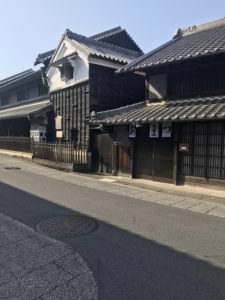
Toshihiko Yamamoto
Real estate investing consultant and author.
Founder of Yamamoto Property Advisory in Tokyo.
International property Investment consultant and licensed
real estate broker (Japan).
He serves the foreign companies and individuals to buy and sell
the real estates in Japan as well as own homes.
He holds a Bachelor’s degree in Economics from
Osaka Prefecture University in Japan
and an MBA from Bond University in Australia
Toshihiko’s book, “The Savvy Foreign Investor’s Guide to Japanese Properties: How to Expertly Buy, Manage and Sell Real Estate in Japan”is now out on Amazon, iBooks (iTunes, Apple) and Google Play.
About the book
Amazon.com Link

